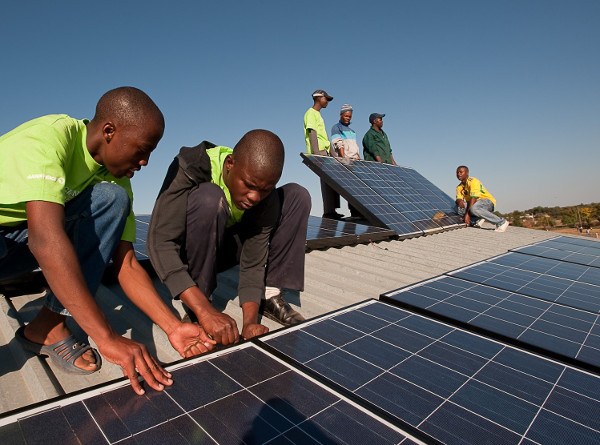The prices of lithium batteries, which are essential components in the creation of solar batteries, have decreased by 85% in a single year, sparking a global demand for clean energy solutions, and the solar sector is thriving as a result.
But Nigeria, a nation rich in solar potential, is left out of this potential boom as rising prices and a declining naira put doubt on it.
Following a market surplus, the price of lithium has dropped by 85% in the last year to $11,930 per tonne, the lowest level since 2020, according to statistics from global financial services provider CME Group Inc.
“We are currently in a phase where an excessive number of new projects are being launched in a short amount of time,” stated William Adams, who oversees commodity markets research at Fastmarkets, a pricing reporting company. “We’ve only recently noticed the retreat.”
The number of US solar manufacturing plants being built by Chinese corporations is rising, positioning China to control the emerging market while other US factories find it difficult to compete even with government subsidies.
According to Goldman Sachs, there will be 200,000 tonnes of excess lithium carbonate equivalent this year, or 17% of the world’s demand; in order to balance the market, “substantial supply cuts” will be necessary.
One of the biggest providers of solar power system solutions globally, Sungrow Middle East and Africa, through Ezzat Sankari, its channels business director, stated: “We are seeing that PV panel prices are drastically falling. In our judgement, this is related to the fact that global demand is now maintaining a certain slower capacity, although manufacturing capacity is still likely two to three times more than demand.”
“Let me also point out that lithium iron phosphate battery technology is becoming less expensive. We normally want to see these types of trends since the lower the price of PV panels and batteries, the larger the demand. The battery is the most expensive component of any solar system,” Sankari explained.
Findings from the News Chronicle revealed that the UK’s used electric vehicle industry is thriving as a result of a price drop that has made them comparable in price to conventional petrol cars.
Level pricing is encouraging more people to purchase battery-powered vehicles, as evidenced by data from Auto Trader, a UK-based classified advertising website. As a result, secondhand EV sales increased by 63 percent in the first half of 2024 compared to the same period the previous year.
“We have reached the price parity point that bridges the affordability gap for the consumer,” said Ian Plummer, Auto Trader’s commercial director.”
“The consumer perceives that the choice of vehicle is a very rational one and is no longer dependent on the feeling of doing the right thing once prices are the same,” Plummer added.
Auto Trader’s findings are consistent with data from the Society of Motor Manufacturers and Traders (SMMT), which reveals that EV sales in the UK surged by 71 percent in the first quarter across all dealerships and sales platforms.
“There’s no denying that this market is expanding quickly,” Plummer said.
He continued, “EVs are less expensive to operate than gasoline-powered cars, which is contributing to the growing trend of used cars.”
The managing director of SolarWorld Africa, Gregor Kuepper, noted that the lower solar pricing is probably going to stay for a few more years.
“With the addition of battery storage solutions, the PV industry in South Africa saw a massive uptake in new installations last year,” he continued.
Solar power has long been promoted as a potential remedy for Nigeria, a country beset by regular power outages.
Even with the recent price reduction that led to a global boom in solar energy and electric vehicles, Nigeria’s economic circumstances remain concerning.
Prices for imported solar panels and batteries have increased in markets like Nigeria that are power-starved as a result of the Naira’s depreciation.
At the official market, the naira has been comparatively stable, trading at about N1,500/$. Based on statistics obtained from the FMDQ Securities Exchange Limited, the most turbulent time occurred on February 20, 2024, when it was over N1,800/$ and headed towards N2,000/$.
Operators claim that if the government had taken into consideration lowering or eliminating the 20 percent tariff on batteries, it would have been simpler for customers and increased investor confidence.
There are other expenses that solar operators must deal with in addition to the battery duty. The Nigerian Customs Service (NCS) levied a five percent charge and a five percent value-added tax (VAT) on solar panels entering the nation in 2018, up from a zero percent duty in the previous year.
Nonetheless, the 20 percent tariff is the greatest and most significant, highlighting the need for batteries for a market for sustainable solar energy.
According to The News Chronicle’s research, the price of a 5.4kWh lithium-ion battery has decreased from N2 million to N2.2 million in May 2023 to between N3 million and N3.5 million at this time.
“Solar Power Naija,” a 5 million solar connection scheme for off-grid communities, was introduced by the Federal Government in 2020.
Only roughly 500,000 Nigerian households, or 1.25 percent of all households, currently use solar energy, according to a report by the impact investing firm All-On, which is backed by Shell and the Boston Consulting Group.



